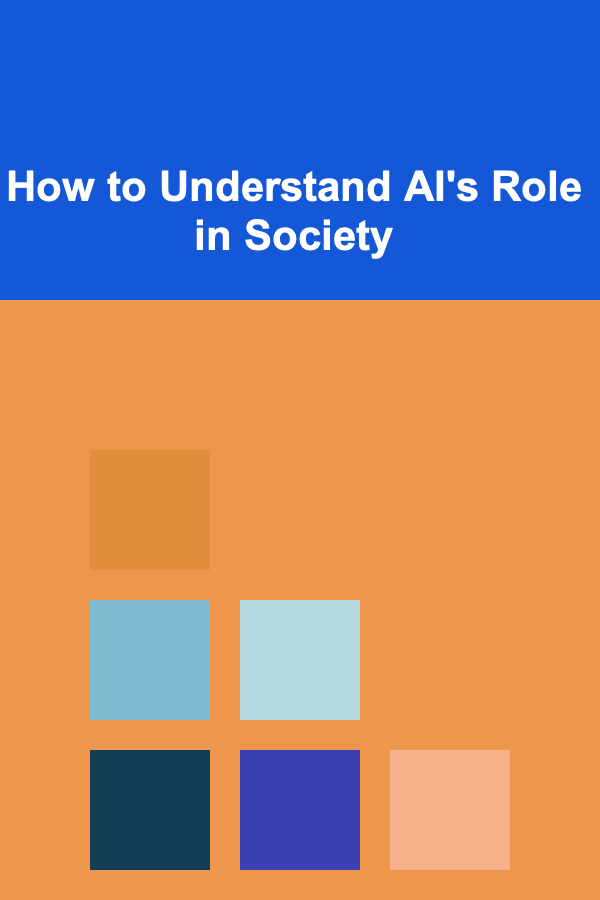
How to Understand AI's Role in Society
ebook include PDF & Audio bundle (Micro Guide)
$12.99$7.99
Limited Time Offer! Order within the next:

Artificial Intelligence (AI) is increasingly becoming a cornerstone of modern society, influencing every sector, from healthcare to education, entertainment to transportation. Yet, despite its widespread presence, many people struggle to grasp the full extent of AI's role in society. This complexity arises from both the rapid pace of technological advancement and the broader societal implications that AI brings. Understanding AI's role in society requires a multifaceted approach, encompassing its technical fundamentals, its influence on industries, its ethical challenges, and its long-term societal effects. This article will delve deeply into these aspects, providing a comprehensive analysis of AI's evolving role and what it means for our future.
The Emergence of AI and Its Technological Foundations
To understand AI's role in society, it is crucial to first examine its origins and technical principles. AI, as a field of study, has its roots in computer science, specifically in the study of algorithms and computational models that can perform tasks that typically require human intelligence. From simple rule-based systems to complex deep learning models, AI technologies have evolved significantly in recent decades.
What is AI?
At its core, AI refers to the simulation of human intelligence in machines that are programmed to think and learn. AI encompasses a wide variety of subfields, including:
- Machine Learning (ML): A method of teaching computers to learn from data without being explicitly programmed. ML algorithms identify patterns and make predictions based on those patterns.
- Deep Learning (DL): A subset of ML, deep learning involves neural networks with many layers (hence the term "deep"). These networks can automatically extract features and patterns from raw data, making them highly effective for tasks such as image recognition and natural language processing.
- Natural Language Processing (NLP): This subfield enables machines to understand, interpret, and respond to human language. NLP powers technologies like chatbots, virtual assistants, and translation systems.
- Computer Vision: The ability of machines to interpret and make decisions based on visual input, often used in autonomous vehicles, facial recognition, and medical imaging.
- Robotics: The integration of AI with physical machines to perform tasks that would otherwise require human dexterity or decision-making.
As AI continues to evolve, it becomes more embedded in daily life, often without the public fully recognizing its presence. Technologies like virtual assistants (Siri, Alexa), recommendation algorithms (Netflix, Amazon), and autonomous vehicles are just a few examples of AI systems that are already pervasive in society.
The Technological Drivers Behind AI
The rapid advancements in AI are driven by several factors:
- Big Data: AI thrives on data. The rise of big data, coupled with advanced data storage and processing capabilities, has enabled the development of more sophisticated AI systems.
- Improved Computing Power: The availability of powerful processors (such as Graphics Processing Units or GPUs) allows for faster and more efficient AI model training, which accelerates the development of AI technologies.
- Advancements in Algorithms: The creation of novel algorithms, especially in deep learning, has allowed AI to tackle more complex problems with greater accuracy.
- Cloud Computing: The advent of cloud services has made powerful AI models and tools more accessible, democratizing AI development across various industries.
These technological advancements have propelled AI into numerous industries, where it performs tasks ranging from basic automation to advanced decision-making, often at a speed and scale that is unimaginable for human workers.
AI's Role in Various Industries
AI has become an integral part of several industries, transforming how businesses operate, interact with customers, and deliver products or services. Below are a few key sectors where AI is playing a pivotal role.
1. Healthcare
AI's impact on healthcare has been nothing short of transformative. From drug discovery to patient care, AI is helping medical professionals provide more accurate diagnoses, personalize treatment plans, and streamline operations.
- Diagnosis and Imaging: AI algorithms are being trained to analyze medical images, such as X-rays, MRIs, and CT scans, with incredible accuracy. For instance, AI systems have been used to detect early signs of cancers, brain disorders, and heart conditions, sometimes outperforming human radiologists.
- Personalized Medicine: Machine learning models are helping to develop more personalized treatment plans by analyzing patient data, including genetics, lifestyle, and environmental factors. These AI systems can recommend specific interventions tailored to individual patients.
- Robotic Surgery: AI-powered robots are becoming more common in surgery. These robots assist surgeons by providing greater precision, reducing human error, and improving recovery times for patients.
- Drug Discovery: AI is also accelerating drug discovery processes by predicting which compounds might be effective in treating diseases, drastically shortening development timelines.
2. Education
In education, AI is shaping the future of learning and teaching. It offers personalized learning experiences, enhanced educational tools, and automated administrative tasks that allow educators to focus more on teaching.
- Adaptive Learning: AI-based platforms can adapt to the needs of individual students, offering customized lessons and assessments. These systems adjust content difficulty based on a student's pace, helping to bridge learning gaps.
- Smart Classrooms: AI can help improve classroom management through tools that monitor student engagement, assess performance, and suggest teaching strategies in real-time.
- AI Tutors: AI-powered tutoring systems are providing additional support to students outside of school hours. These virtual tutors can offer assistance on a variety of subjects, reinforcing what students learn in the classroom.
- Administrative Efficiency: AI is helping automate administrative tasks like grading and scheduling, freeing up time for teachers to focus on their students.
3. Transportation
The transportation industry has been one of the most visible sectors impacted by AI. The rise of autonomous vehicles, combined with AI-driven optimization of traffic flow, is fundamentally changing how we think about mobility.
- Autonomous Vehicles: Companies like Tesla, Waymo, and others are developing self-driving cars that use AI to navigate roads, detect obstacles, and make real-time decisions based on sensor data. These vehicles have the potential to reduce traffic accidents, improve fuel efficiency, and revolutionize the way people commute.
- Traffic Management: AI is being used to optimize traffic flow in cities. By analyzing real-time traffic data, AI can adjust traffic lights, reroute vehicles, and predict traffic congestion, ultimately improving efficiency and reducing travel time.
- Logistics and Supply Chain: AI is also transforming supply chains through predictive analytics, route optimization, and inventory management. Companies can predict demand patterns and optimize delivery routes, reducing costs and improving efficiency.
4. Business and Finance
AI has reshaped the landscape of business operations and finance, automating processes, enhancing decision-making, and improving customer experiences.
- Customer Service: AI-powered chatbots and virtual assistants are now commonplace in customer service. These systems can handle basic queries, resolve issues, and escalate more complex problems to human agents.
- Predictive Analytics: In finance, AI systems are used to analyze market trends and predict stock prices, enabling traders and investors to make more informed decisions. AI can also assist with fraud detection by analyzing transaction patterns and identifying suspicious activities.
- Automation of Business Processes: AI tools are automating repetitive tasks, such as data entry and document review, which can significantly reduce operational costs and improve efficiency.
The Ethical Challenges of AI
While AI brings immense potential, it also presents significant ethical challenges. These issues stem from concerns about privacy, bias, accountability, and the potential for misuse. Addressing these concerns is critical for ensuring that AI benefits society as a whole.
1. Privacy and Data Security
AI systems rely heavily on data, much of which can be sensitive in nature. For instance, in healthcare, AI models are trained on patient data, while in finance, they are trained on personal financial information. If this data is mishandled or accessed by unauthorized parties, it can lead to significant privacy breaches.
Furthermore, AI systems that collect data from individuals can raise concerns about surveillance. There is a growing debate about how much data companies should be allowed to collect and what measures should be in place to protect users' privacy.
2. Bias and Fairness
AI models are only as good as the data they are trained on. If the data used to train an AI system is biased, the system can perpetuate and even exacerbate societal inequalities. For example, AI systems used in hiring or law enforcement have been found to show biases against minority groups, leading to unfair treatment.
To address this, researchers and policymakers are working on ways to make AI more transparent and accountable, ensuring that AI models are trained on diverse and representative datasets.
3. Accountability and Responsibility
As AI systems become more autonomous, the question of who is responsible for their actions becomes increasingly complex. For instance, if an autonomous vehicle causes an accident, should the responsibility lie with the manufacturer, the software developer, or the driver? The challenge of assigning liability in cases involving AI will require new legal frameworks and regulations.
4. Job Displacement
AI is capable of automating a wide range of tasks that were previously performed by humans, leading to concerns about job displacement. In industries like manufacturing, retail, and customer service, AI-driven automation is expected to eliminate many low-skill jobs. While new jobs may be created in fields related to AI development, there is concern that workers without the necessary skills will struggle to transition into new roles.
The Long-Term Societal Impact of AI
Looking toward the future, AI's role in society will likely continue to grow, with profound implications for individuals, industries, and governments. While it holds the promise of improving quality of life and solving some of society's most pressing problems, it also introduces risks that need to be carefully managed.
1. Economic Growth and Innovation
AI has the potential to drive significant economic growth by creating new industries, products, and services. It can also improve productivity in existing sectors, leading to greater efficiencies and cost savings. However, the benefits of AI-driven growth must be distributed equitably, ensuring that it does not exacerbate income inequality.
2. Ethical AI Development
For AI to fulfill its potential, it is crucial that its development is guided by ethical principles. This includes promoting transparency, fairness, and accountability in AI systems, ensuring that they serve the common good and do not exacerbate societal inequalities.
3. Human-AI Collaboration
Rather than viewing AI as a replacement for humans, the future of AI should be one of collaboration. By augmenting human abilities with AI, people can focus on more creative, strategic, and impactful tasks. This partnership has the potential to unlock new possibilities in fields such as education, healthcare, and science.
4. Global Cooperation on AI Regulation
As AI continues to have a global impact, international cooperation will be necessary to develop standards and regulations that ensure its responsible use. Governments, industry leaders, and researchers must collaborate to create policies that promote the benefits of AI while minimizing its risks.
Conclusion
AI is already playing a significant role in shaping society, and its influence will only continue to grow in the coming years. By understanding AI's technological foundations, its applications across various industries, and the ethical challenges it presents, society can better navigate the complexities of this powerful technology. AI has the potential to revolutionize the world, but its development must be handled responsibly to ensure it benefits everyone and mitigates its potential harms.
Reading More From Our Other Websites
- [Personal Care Tips 101] How to Choose the Best Mascara for a Bold, Statement Look
- [Organization Tip 101] How to Use Folding Techniques for Space-Saving Storage
- [Personal Investment 101] How to Harness the Power of Compounding for Long-Term Wealth Growth
- [Personal Finance Management 101] How to Plan for Healthcare Costs in Your Budget
- [Home Cleaning 101] How to Clean a Carpet: Step-by-Step Guide for Deep Cleaning
- [Home Soundproofing 101] How to Seal Sound Leaks: Essential Tips for a Quiet Home Environment
- [Toy Making Tip 101] Sew-Crafted Kids' Classics: Reimagining Traditional Toys with a Sewing Machine
- [Sewing Tip 101] From Fabric to Fashion: A Step-by-Step Guide to Sewing Your First Outfit
- [Organization Tip 101] How to Manage Time Zones for International Classes
- [Metal Stamping Tip 101] How Automation is Transforming Metal Stamping Solutions Today

How to Prepare Quick & Healthy Weeknight Pastas
Read More
How to Research and Choose the Right Wedding Officiant
Read More
How to Stage a Home for Quick Sales
Read More
How To Get Voluminous Hair with Simple Tricks
Read More
How to Conduct Electrical Safety Audits in Industrial Settings
Read More
10 Tips for RV Trip Planning on a Budget
Read MoreOther Products

How to Prepare Quick & Healthy Weeknight Pastas
Read More
How to Research and Choose the Right Wedding Officiant
Read More
How to Stage a Home for Quick Sales
Read More
How To Get Voluminous Hair with Simple Tricks
Read More
How to Conduct Electrical Safety Audits in Industrial Settings
Read More